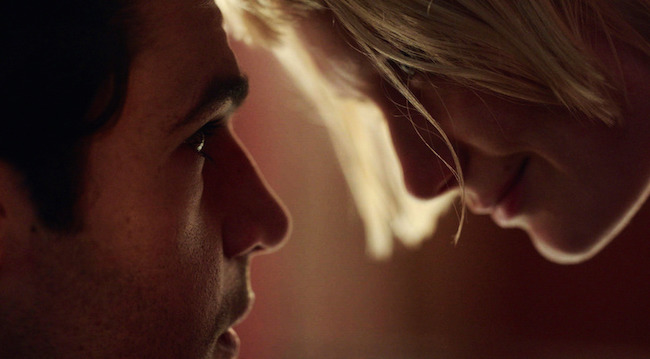Film Review: “Piercing” — A Kinked-Out Curio
Piercing choreographs its weirdness early and often.
Piercing, directed by Nicolas Pesce. (Screened at this year’s Brooklyn Horror Film Festival, October 11 through 18.)

A scene featuring Christopher Abbott and Mia Wasikowska in “Piercing.”
By Isaac Feldberg
Consider Piercing with the largely sacrosanct wisdom of Alfred Hitchcock in mind — “there is no terror in the bang, only in the anticipation of it” — and the scariest scene in this kinked-out little curio (based on a novel by Ryû Murakami) is its first.
A man (Christopher Abbott) looms large over a cradle, an ice pick gripped in one sweaty hand, staring down at his crying infant daughter. His intentions, writ large within the inky darkness of his eyes, are terribly clear. He brings the weapon back, preparing to drive it home; she stares up, uncomprehending. His desire to puncture flesh and bone, to cut short the wailing, feels compulsory, not passionate, and all the more inevitable for it. At seemingly the last moment, his wife (Laila Costa) cries out from the other room. He lowers the ice pick; this strange spell, for now, is broken. The baby peers up at him and speaks (or at least seems to), in a deep and warped baritone: “You know what we have to do, right?”
So, yes, Piercing — the second movie by Eyes of My Mother provocateur Nicolas Pesce — choreographs its weirdness early and often, especially once the man, named Reed, arrives at a hotel room, hoping to appease his inconvenient bloodlust. His scheme is almost childlike in its grim simplicity: summon a sex worker, tie her up under the guise of some light S&M play, then dismember her in the tub, disposing of the body and returning to his domestic idyll, inner demons sufficiently exorcised.
The tip-off to Reed’s off-kilter headspace: the only thing this plot doesn’t account for is the call girl having any autonomy of her own. When he opens the door to welcome Jackie (Mia Wasikowska), an immediately suspicious individual with a European assassin’s blonde bob and a skittish tension about her shoulders, it’s clear just how much of a miscalculation this was.
So begins a cat-and-mouse game replete with power reversals and dark revelations, as it becomes gruesomely obvious that Jackie gets off on being hurt as much as Reed gets off on hurting her. Pesce largely eschews straightforward explanations when teasing out what dark histories are guiding these two characters’ psychosexual mind games. Instead, he underscores the borderline absurdity of such indulgent fetish exploration by remaining (with the exception of one ill-advised flashback sequence) trapped with his leads in their makeshift dungeon.
His aim, particularly as Piercing progressively spills over into dark comedy in its third act, appears more to craft a perverse paean to Dario Argento-era giallo cinema, one that’s styled with such obsessive artifice as to recall Quentin Tarantino’s exuberant pastich-ing one minute and Wes Anderson’s neat-freak aesthetic the next. The few instances in which we leave Reed’s sleek hotel room behind reveal that the skyscraper in which it’s nestled is a miniature, not a real building; split-screens abound, as do some propulsive needle drops that position the movie comfily within the heightened unreality of ’70s Euro-cinema.
Piercing’s central tension, too, has a curiously ersatz sway to it. Reed and Jackie’s evening gradually takes the shape of a death-dance; it’s unclear who’s leading or if both are in essence surrendering, allowing unspoken desires to tug violently at their strings. At 81 minutes, Pesce’s movie feels somewhat abbreviated, knowingly taunting its viewers with an ending too sudden to offer much satisfaction, let alone resolution. In a movie focused on the psychosexual release to be found in acting on forbidden urges, it makes a sick kind of sense that Piercing commits to its most playful knife-twist with a infuriatingly repressed flourish of cinematic withholding.
Isaac Feldberg is an entertainment journalist currently based in Boston. Though often preoccupied by his on-going quest to prove that Baby Driver is a Drive prequel, he always finds time to appreciate the finer things in life, like Liam Neeson.
Tagged: Brooklyn Horror Film Festival, Isaac Feldberg, Nicolas Pesce

[…] as reviews by Amy Nicholson for Variety, Marisa Mirabal for /Film, Haleigh Foutch for Collider, Isaac Feldberg for The Arts Fuse, Dan Schindel for Vague Visages, and Andrew Todd for Birth. Movies. […]